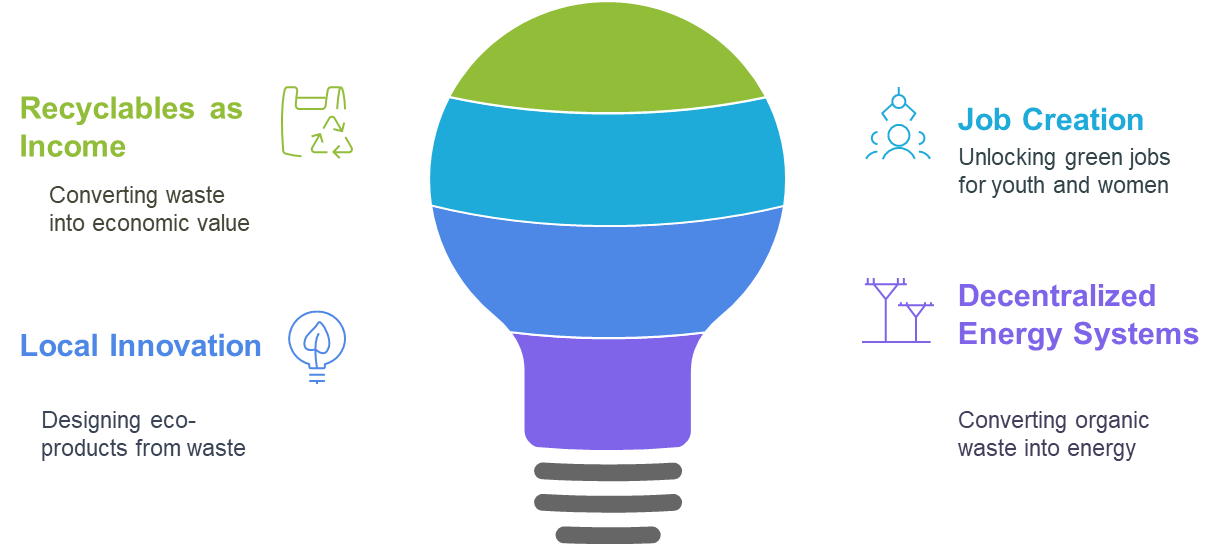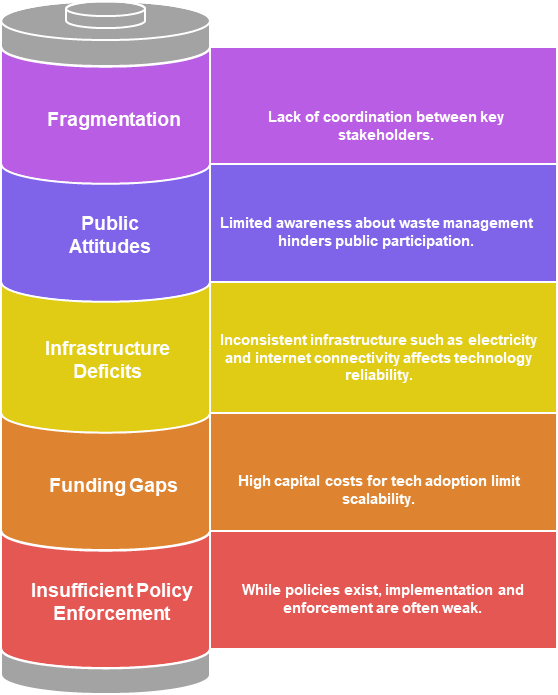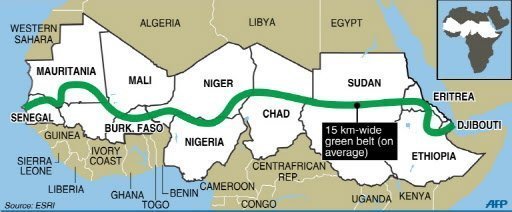Introduction
Nigeria, Africa’s most populous country and largest economy, is grappling with a growing waste crisis. Nigeria as a lower-middle-income country, has been the largest economy in Africa since 2012. Nigeria has an estimated population of 206.14 million people (2020) with an annual population growth rate of 2.5%. Nigeria’s population is projected to reach 262.9 and 401.3 million people in 2030 and 2050, respectively, generating thousands of tonnes of waste daily, much of which ends up in open dumps or waterways. This linear model of “take-use-dispose” is both environmentally unsustainable and economically inefficient. In Nigeria, urban waste management remains a critical challenge, with cities like Lagos, Abuja, Kano and Port Harcourt struggling with inefficient waste collection, poor disposal methods, and environmental pollution.
Conventional waste management practices, characterised by linear models of extraction, production, consumption, and disposal, have led to environmental pollution, public health risks, and resource depletion. Therefore, in the wake of environmental degradation and resource depletion, a shift from traditional waste management practices toward a circular economy, supported by smart waste management systems, offers a powerful framework for transforming Nigeria’s waste challenges into opportunities for innovation, jobs, and environmental sustainability.
Making sense of the Circular Economy
A circular economy is a regenerative economic model designed to minimise waste and make the most of resources. It is a model of production and consumption, which involves sharing, leasing, reusing, repairing, refurbishing and recycling existing materials and products as long as possible. In this way, the life cycle of products is extended. In practice, it implies reducing waste to a minimum.
When a product reaches the end of its life, its materials are kept within the economy wherever possible, thanks to recycling. These can be productively used again and again, thereby creating further value.
Achieving a circular economy will require transformation throughout the supply chain and significant involvement of all the key actors, including government, business, researchers, and consumers, with the goal of achieving economic sustainability; the circular economy model works at three different levels: micro (products, businesses, and customers), macro (eco-industrial parks), and macro (cities, regions, countries, and beyond). This means fostering social advancement (the creation of jobs), environmental innovation (renewable energy, urban mining), and GDP growth to create economic prosperity.
Unlike the traditional linear economy, where products are discarded after use, the circular approach focuses on:
- Designing products for reuse, repair, and recycling
- Extending product life cycles through maintenance and remanufacturing
- Recovering materials to be reintroduced into the economy
In Nigeria, where waste often poses public health and environmental risks, circular thinking can provide both ecological relief and economic opportunity. Circular practices in Nigeria should focus on recycling plastics, converting waste to energy, repurposing agricultural by-products, and implementing repair and refurbishing services, all of which create economic opportunities while reducing environmental impact.
Waste Management in Nigeria: The Current Landscape
According to the World Bank, Nigeria currently generates at least 32 million tonnes of solid waste annually, and this number is projected to rise to 107 million tonnes by 2050. However, only 30% of the waste generated is efficiently collected and disposed of. The rest is either openly dumped, burnt, or abandoned by highways and street corners, while others end up in open drains and nearby streams and water channels, littering streets and clogging drainage channels, particularly in informal settlements. Major issues include:
- Poor waste collection infrastructure
- Lack of formal recycling systems
- Informal sector dominance
- Limited public awareness
- Weak policy enforcement
These problems not only degrade the environment but also represent lost economic value from unutilized recyclable materials and missed job creation potential.
The Role of Smart Waste Management Systems
Smart waste management (SWM) leverages technology, such as IoT (Internet of Things), AI (Artificial Intelligence), data analytics, and mobile apps, to improve how waste is monitored, collected, sorted, and processed. In Nigeria, the SWM systems can be deployed as:
- Smart Bins with Fill-Level Sensors: Piloted in urban areas like Lagos, smart bins can alert authorities when full, reducing overflow and illegal dumping.
- Mobile Waste Apps: Platforms like Wecyclers and Trashcoin incentivise recycling by allowing users to exchange sorted waste for rewards, cash, or points.
- Waste Mapping Tools: GIS and satellite imagery are being explored by agencies like the Nigerian Environmental Society (NES) to identify dumping hotspots and streamline collection routes.
- Data Dashboards: State governments could use real-time dashboards to track waste generation patterns, identify bottlenecks, and plan smarter interventions.
Nigeria has a large informal waste sector that plays a significant role in material recovery. Integrating circular principles with digital technologies can formalise this sector, increase efficiency, and ensure better outcomes for people and the planet. Globally, there are promising emerging technologies, such as the RecyclX platform, which utilises dynamic QR codes and a progressive ledger system to ensure real-time traceability and transparency across supply chains. Custom-built for diverse environments, it enhances waste management efficiency, compliance, and sustainability, driving effective resource utilisation and fostering a circular economy.
Key Opportunities in Nigeria’s Circular Economy:

Challenges in Nigeria’s waste management solutions adoption
Despite progress, Nigeria faces significant barriers to the widespread adoption of circular and smart waste solutions:

Case Studies and Success Stories in Nigeria
In recent years, some private and public organisations within the waste management ecosystem have made giant strides towards contributing to waste management in line with the circular economy concept, and a few of these initiatives include:
- Wecyclers (Lagos): This award-winning social enterprise uses low-cost cargo bicycles and an SMS-based platform to collect sorted waste from households in exchange for points. Wecyclers has partnered with companies like Nestlé and Unilever to boost plastic collection and recycling.
- RecyclePoints (Abuja & Port Harcourt): RecyclePoints allows households to earn “points” for recycling, which can be exchanged for household items. It has created employment opportunities for waste pickers and promoted urban sanitation.
- Lagos Waste Management Authority (LAWMA): LAWMA has been working toward digitising its operations, including the use of apps to track waste truck routes, introduce data systems for waste analytics, and support public-private partnerships.
Policy and Strategic Recommendations
To support circular and smart waste systems, Nigeria must adopt an enabling environment with a strong policy foundation:
- National Circular Economy Policy: Develop a clear framework that aligns waste management, industrial development, and climate goals.
- Subsidies and Incentives: Offer tax breaks and grants to recycling firms and green entrepreneurs.
- Public-Private Partnerships: Leverage private sector efficiency with government support to expand services.
- Education and Awareness Campaigns: Promote waste segregation and recycling through schools, religious centres, and community programs.
- Capacity Building: Train waste workers and equip local governments with tools for data-driven decision-making.
Nigeria recently launched a Circular Economy Roadmap that was developed with the support of experts funded via the EU-SWITCH to Green Facility. The Roadmap sets out a comprehensive plan to transform Nigeria from a linear to a circular economy by 2050.
Conclusion
As Nigeria faces the twin pressures of urbanisation and environmental degradation, embracing the circular economy alongside smart waste management systems offers a sustainable path forward. It is not merely about managing waste, it is about rethinking systems, fostering innovation, and building an economy that works for people and the planet.
By turning waste into wealth and leveraging technology to optimise efficiency, Nigeria has the opportunity to become a regional leader in green innovation, job creation, and sustainable development.
References
Adetola, I. M., & van Staden, M. (2023). Innovative Solutions to Waste Management: A Case Study of Lagos State, Nigeria.
Correa, R. G., & Serra, E. G. (2025). Circular economy and its strategies: an overview of scientific production between 2014 and 2023. REVISTA DELOS, 18(63), e3607-e3607.
Improving Solid Waste and Plastics Management in Lagos State: A Way Forward, Retrieved May 25 2025, from https://documents1.worldbank.org/curated/en/099101824172020522/pdf/P1761781eb744507f184b01f525451f4014.pdf
Izuchukwu Precious, O., Zino Izu, O., Theresa Ojevwe, A., & Frank Chudi, A. (2025). Smart Cities and Circular Economy: Advancing Waste Management Through Urban Innovation in Nigeria. Journal of Economy, Tourism and Service, 4(2), 85-115.
Rezk, M. R., Piccinetti, L., Salem, N., Omoruyi, T. U., & Santoro, D. (2024). Nigeria’s transition to a circular economy: Challenges, opportunities and future perspectives. Insights Into Reg. Dev, 6, 11-23.
World Bank. 2024h. Improving Solid Waste and Plastics Management in Lagos State: Creating a Plastics Recycling Market in Lagos State. Washington, DC: The World Bank.
Written by: Mustapha Dewu



